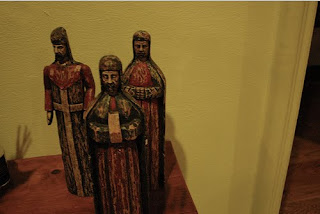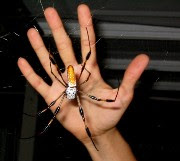 Most summers, my family of six took off for an extended camping trip, a brave thing to do on my parents' part. When we were little, we had a cumbersome canvas tent that my father, with our "help", wrestled into our shelter for the night. It was an ordeal often performed in the dark and the primary source of the McDonough kids' cussing prowess.
Most summers, my family of six took off for an extended camping trip, a brave thing to do on my parents' part. When we were little, we had a cumbersome canvas tent that my father, with our "help", wrestled into our shelter for the night. It was an ordeal often performed in the dark and the primary source of the McDonough kids' cussing prowess. The Cades Cove trip was one marked by bear encounters. They were extremely brazen that year, lumbering down the drive in front of our tent, rooting in the trash cans, and posing for pictures. The park rangers held nightly campfires to explain how dangerous they were and why giving them food was a really bad idea. They told gruesome stories of people who had disregarded their advice and taught us how to hang our food from a tree.
We knew better. The youngest of us knew better, even without the park rangers' presentations. My father was an Eagle Scout and a Marine, and we had camped for years. It had, however, been a long day trip into Gatlinburg. In our big blue station wagon, two of us had to sit backwards and we were all prone to car sickness. On the curvy mountain roads, Randy turned greener and greener. We kept asking him if he felt sick and he kept denying it. As we entered Gatlinburg, he leaned over the front seat to make his final denial, one that became immediately untrue. We added more words to our vocabulary as my parents searched for a public bathroom to clean up in. Despite the bad beginning, we had a great time, gorging on candy and visiting shops. We returned after dark, exhausted and dirty and all somewhat queasy. Scott and I crawled into the pup tent we shared near the big tent, and Mom and Dad fell asleep with the little ones at the same time.
A loud slurping woke my father much later. He peeked out of the door of the tent to see a large black bear seated on our picnic table. Dad's first and second born children were close but out of his reach, and he was too shocked to even start cussing. He watched in horror as the bear drank the orange juice left over from breakfast, sampled the coffee grounds and then started in on the all-day sucker one of us had bought in Gatlinburg. The bear liked the sucker. He began eating it with more and more enthusiasm until finally his teeth got stuck in the chewy candy. Then he became unhappy and my father became more worried, perhaps envisioning the next day's headlines and imagining the next park rangers' presentation. Finally the bear got himself unstuck and went off to search for more delicacies in some equally stupid campers' sites.
Scott and I were furious that we had slept through the adventure. We might have accused my father of making up the story were it not for the evidence on the table: spilled juice and coffee grounds, a half-eaten sucker, and an unmistakable paw print on a postcard we had bought in Gatlinburg. Scott had his revenge though. Later that day, he made a trip to the "comfort station". Opening the door to leave, he came face to belly with a bear. Some adult jerked him back in and they held the door closed until the bear lost interest and left. The other three of us were very jealous as he had bragging rights that trumped anything we had to offer.
As grown-ups, my siblings and I have on a few occasions gotten together to take our children camping. The facilities at national campgrounds must use Scott tissue because they have toilet paper dispensers that say "Scott" on them. But we like our explanation better. We solemnly tell the next generation the story of Uncle Scott and the bathhouse bear and explain that the toilet paper dispensers are in honor of his adventure. In our family, a good story always trumps mere facts.






 in researching the dates, I found that Thanksgiving wasn't until November 28 that year. President Kennedy was shot on Friday, November 22; Oswald was shot on Sunday, November 24. I don't know why we had the whole week off from school. I don't know why I can so clearly see that Macy's Day Parade. Memories are strange and unreliable things. But I do know that I've never liked parades since.
in researching the dates, I found that Thanksgiving wasn't until November 28 that year. President Kennedy was shot on Friday, November 22; Oswald was shot on Sunday, November 24. I don't know why we had the whole week off from school. I don't know why I can so clearly see that Macy's Day Parade. Memories are strange and unreliable things. But I do know that I've never liked parades since.





